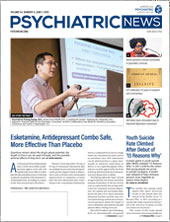Institutional disavowal of racism in psychiatry is pervasive, and educators and supervisors must address it more thoroughly as they train residents and young psychiatrists, said presenters in a forum titled “The Impact of Race and Racism on Psychiatric Training and Practice” at the Black Psychiatrists of America 50th Anniversary Conference in April at National Harbor, Md. The session was moderated by APA Board Member Ayana Jordan, M.D., Ph.D., and chaired by Constance E. Dunlap, M.D., Washington Psychiatric Society representative to the Assembly of APA.
In introducing the panel, Dunlap referred to a paper in the December 1970 issue of the American Journal of Psychiatry by prominent black psychiatrists in which the authors noted that race was rarely considered in terms of its effect on the nature, dynamics, prognosis, and course of therapy in psychiatric illness.
“Nearly 50 years later, this remains a problem,” said Dunlap. “However, while we have been able to disregard this dynamic, current geopolitical pressures are compelling us to take a different course.”
Psychiatry residents Jessica Isom, M.D., M.P.H., and Flavia DeSouza, M.D., M.H.S., described the results of a mixed-methods study they conducted at Yale University Department of Psychiatry. It was designed to assess the impact of ethnoracial diversity on discussions of race within supervisory relationships and within patient encounters with psychiatry residents in a psychodynamic psychotherapy clinic.
Preliminary qualitative data from the supervisor survey revealed themes such as guilt over the inadequate attention given to racial and ethnic dynamics in curricula and current practice, disavowals such as “I can’t change my race or my age,” and regret over unsuccessful attempts to address ethnoracial interactions with trainees. While some residents acknowledged that their supervisors had educated them on cultural elements applicable to their patients, others felt their supervisors were doing their best to listen to questions and concerns about race and racism, but were not truly willing to immerse themselves in the topic.
“This work was emotionally and physically exhausting,” Isom said. “We dealt with white guilt, the learned helplessness of supervisors and residents, and a lot of frank honesty that was at times difficult to hear about the lack of education and training about this topic.”
Eindra Khin, M.D., director of the Psychiatry Residency Program and the Human Rights Clinic at George Washington University in Washington, D.C., discussed the challenges of addressing racial biases in medical education. She focused on the need to train the trainers and emphasized that educators and administrators need to be proactive in pressing for changes in curricula.
“The ultimate goal is to establish a more cohesive program that carries into the clinical years. For us to do this, we cannot put the burden on the trainees. We need educators who are well versed in [issues of] race and racism,” Khin said. “The impact of the institution’s cultural climate and values on allocating curriculum time and resources can make or break these efforts. If the administration doesn’t buy in, students can see [issues of race and racism] as irrelevant to their future practice.”
Ebony Dennis, Psy.D., an adjunct professor in the Clinical Psychology Doctoral Department at the Chicago School of Professional Psychology’s Washington, D.C., campus, provided an overview of how racism and race-based trauma are transmitted from generation to generation.
U. Diane Buckingham, M.D., a psychiatrist in private practice in Overland, Kan., who is known for developing culturally sensitive methods of diagnosing and treating mental illness in children and adolescents, rounded out the forum by discussing the need to foster resilience in multiracial children through racially and culturally sensitive care. ■
“Problems of Black Psychiatric Residents in White Training Institutes” can be accessed
here.


